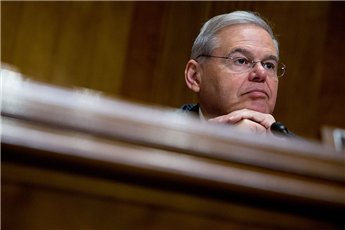The Iran Solution Looks Like it Needs Military Help
IBDEditorials.com

Senate Foreign Relations
Committee member Sen. Bob Menendez listens during
debate on the Iran Nuclear Agreement Review Act of
2015 on Capitol Hill on April 14, 2015. AP
Iran Deal: Critics of the nuclear pact with Tehran are exposing what should have been in the forefront of Americans' minds all through these misguided negotiations: the ultimate need for a military solution.
Senate Foreign Relations Committee Ranking Democrat Bob Menendez of New Jersey, appearing on ABC News on Sunday, pointed out, "We have gone from preventing Iran having a nuclear ability to managing it."
When President Obama announced a deal to negotiate a deal with Iran in November 2013, the press treated it as if the hard part was done and what lay ahead were just formalities. Obama called it "a new path toward a world that is more secure — a future in which we can verify that Iran's nuclear program is peaceful and that it cannot build a nuclear weapon."
Secretary of State John Kerry and America's P5+1 negotiating partners, of course, have caved on that requirement. This deal very much leaves Iran with the ability to build a nuclear weapon.
Menendez, whom the Obama Justice Department thought it had silenced by hitting him with an ethics probe, noted:
"We started off with the wrong premise ... that Iran could not keep its nuclear infrastructure, at least all of it."
Instead, Iran still gets to have a plutonium reactor, and "we have uranium enrichment deep inside of a mountain," as Menendez said. "That doesn't happen for a peaceful civilian program."
Even under a deal, the senator said, he hopes that Obama "makes a very clear statement to Iran that as it relates to the future, we cannot accept Iran having a nuclear weapon, period. That's the premise we started on. That's the premise we should finish on."
Which means we're likely back to where we were before any talks or deal — having to attack Iran sooner or later before the world's foremost terrorist client state becomes the world's sole nuclear-armed terrorist state.
These negotiations have been a colossal bait and switch. The people of the United States and the other P5+1 countries were under the impression that their negotiators would bring home a deal that would, as Obama claimed, "prevent Iran from obtaining a nuclear weapon," a viable alternative to a "rush towards conflict."
The infamous White House "fact sheet" after the 2013 announcement promised "a comprehensive solution that would constrain Iran's nuclear program over the long term, provide verifiable assurances to the international community that Iran's nuclear activities will be exclusively peaceful, and ensure that any attempt by Iran to pursue a nuclear weapon would be promptly detected."
Like so much else promised by this president, it was too good to be true. If we can detect violations, a big if, any serious attempt to re-impose sanctions would mean exposing the deal as a failure — an admission that roughly 18 months of talks were a dangerous waste of time. It won't happen.
We have foolishly delayed the inevitable. A
pre-emptive military operation to prevent a future
atomic 9/11 that would incinerate millions of
innocents is one of the few options left.

